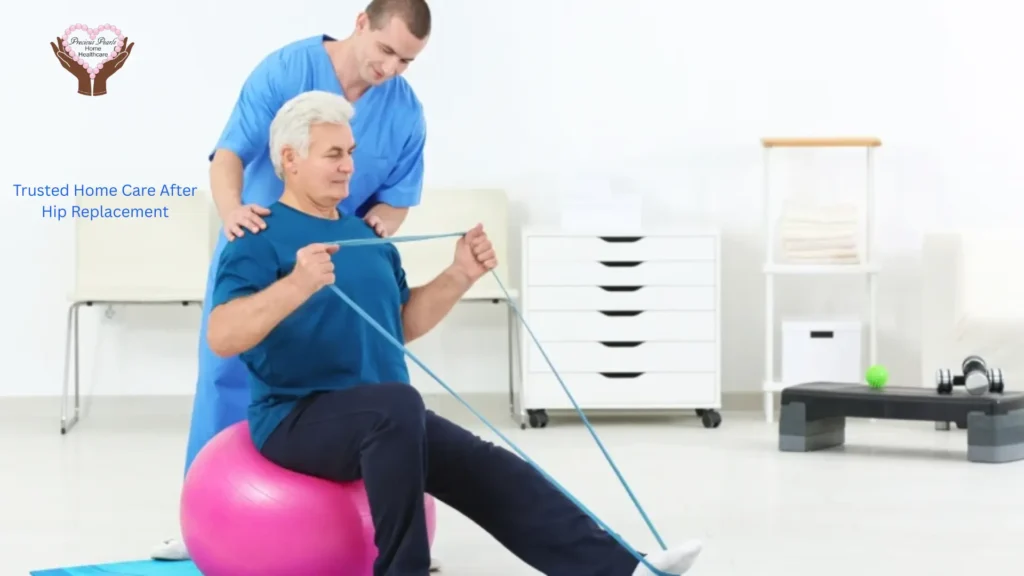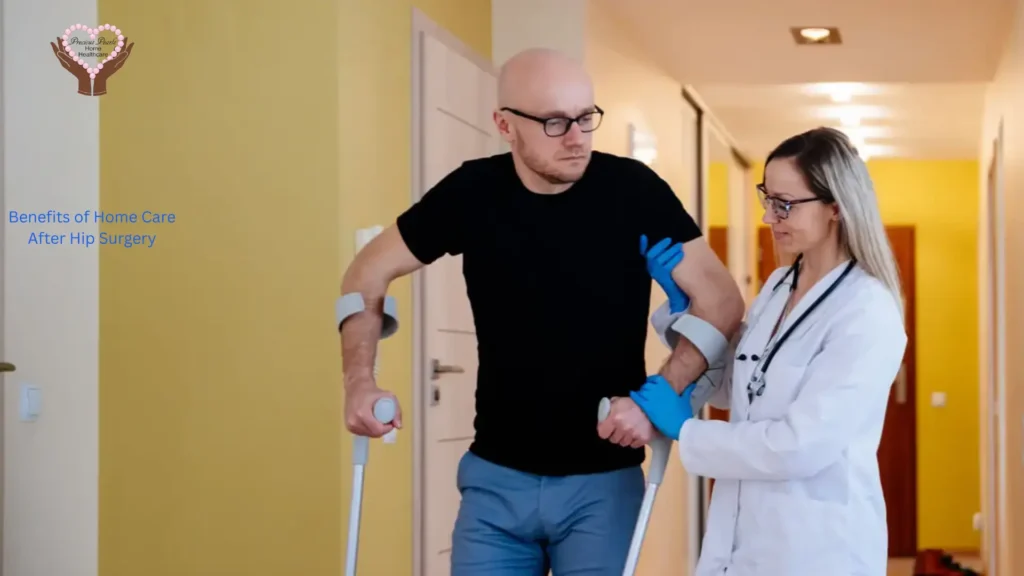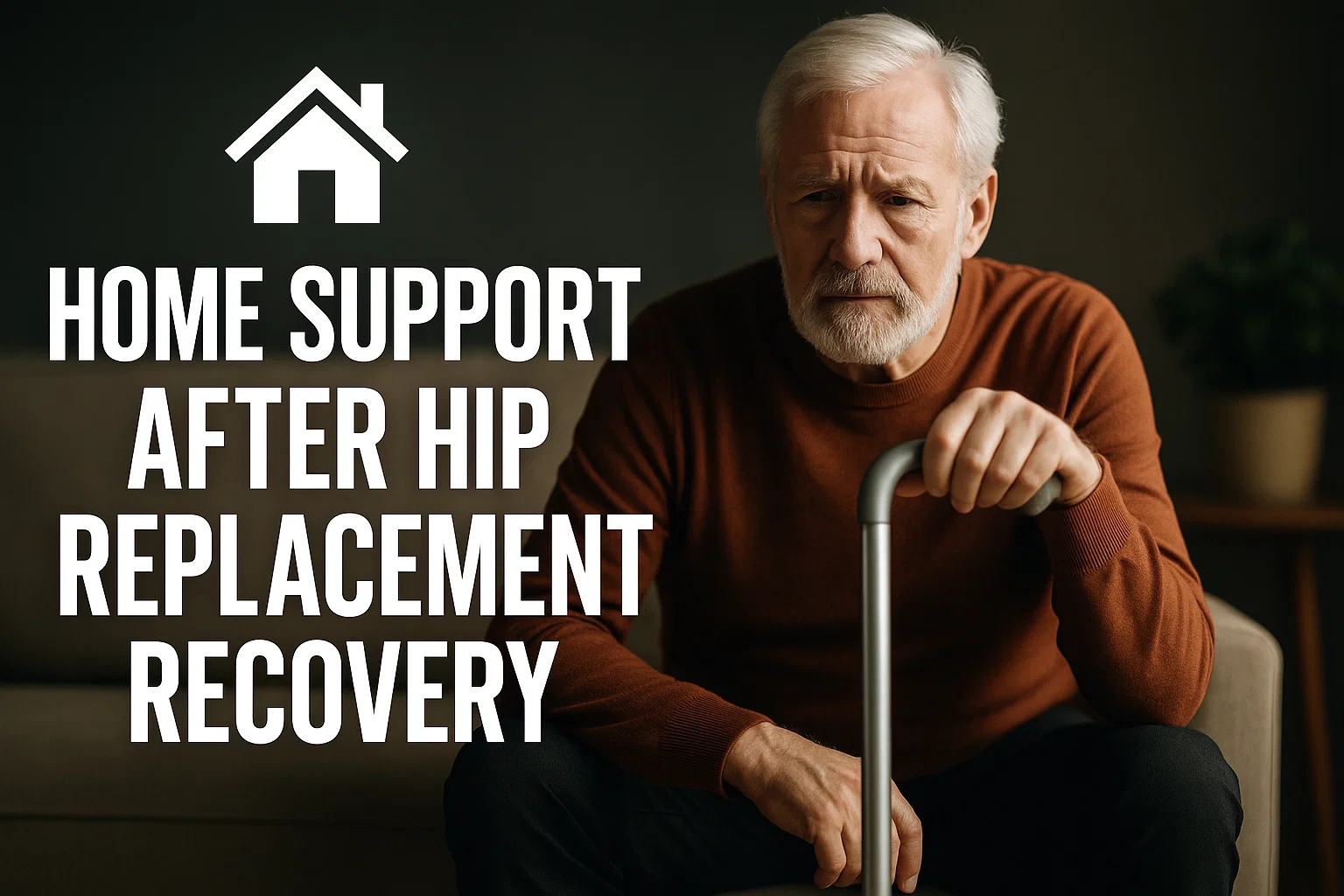Post-hip replacement surgery is a huge leap towards mobility and independence. However, the surgery is not the only thing that matters; the process that follows at home is equally important. Patients are usually required to be assisted, guided, and forcefully assisted daily to ensure that recovery becomes smooth and secure.
Families in North Bellmore tend to rely on trusted home care services to assist their loved ones in settling down following hip replacement. Patients can experience setbacks, prevent falls, and gain confidence returning to everyday life with the proper care at home.
Importance of Home Care After Hip Replacement
A Home care post-hip replacement is not only convenient but safe and healing. Following surgery, patients are usually feeble, unstable, and in pain. They may fall, miss medicine, or overstretch the new joint without the proper support.
Professional caregivers are helpful in giving structure and security in recovery. They are useful in moving around, day-to-day tasks, and exercise reminders. Such guidance is necessary since the initial weeks at home would be the most crucial towards a successful recovery.
What Does Trusted Home Care After Hip Surgery Include?
Hip replacement in North Bellmore generally has a broad scope of services offered to its residents in the name of home care, which eases the healing process. These are customizable to meet the needs of each patient based on the prescriptions of their doctor and their individual needs. Common services include:
- Mobility support to assist patients in walking safely on walking aids, canes or using crutches.
- Postoperative physical therapy to promote exercises to heal the hip.
- Cooking and household assistance give patients the time to concentrate on healing.
- Reminders on medications to avoid missing or taking two doses.
- Prevention measures of falls at home.
- Friendship and emotional support to make patients motivated.
Such services not only secure the patients against complications but also provide family peace of mind.
Trusted Home Care After Hip Replacement

Hip surgery may be a difficult process to recover from, yet with the support of trusted home care in North Bellmore, you are not alone. We are going to take a further look at what the home-based recovery means, what difficulties patients have to encounter, and the way professional care can help.
Understanding the Hip Surgery Recovery Timeline with Home Care
After surgery, most patients spend a few days in the hospital. After they come back home, the real healing process starts. Home care Hip surgery recovery may appear as follows:
- The most assistance is required by patients in Weeks 1-2. It may be hard to stand, walk, bathe and even dress. Caregivers tend to give practical support to ensure that patients do not overstretch a new joint.
- Week 3-6: Mobility is slightly improved. Patients can also start to walk a little and do light exercises. Caregivers also give support and remind patients of physical therapy regimes.
- Week 7-12: The patients become stronger and independent. Home care can change to a less intensive level of hands-on to light assistance with the domestic chores, fall prevention, and preparation of meals.
- 3 months and further: Most patients are independent again, although some may still require part-time home care to be assisted with mobility or companionship.
The home care providers state that every patient is unique and despite the stage of their illness, their safety and recovery are the two priorities.
Mobility Assistance for Hip Replacement Patients
One of the greatest postoperative hip replacement surgery challenges is mobility. The use of walkers, canes, or crutches in the initial weeks and assistance to help a patient move safely between rooms are some of the common occurrences among patients. Mobility support of hip replacement patients covers:
- Assistance in rising and sitting.
- Assistance during walks (that are short).
- Safe mobility aid instructions.
- Bathrooms and kitchens: Preventing slips.
In the absence of this assistance, the patients are at risk of falls, which may cause harm to the new joint or postpone the healing process.
Physical Therapy Support After Hip Surgery
Physicians tend to prescribe activities that enhance the body’s muscles and make them more flexible. However, it is not always easy to stick to those exercises without reminders or instructions. It is where physical therapy post-hip surgery assistance comes. Caregivers can:
- Promote routine therapy to patients.
- Aid in safe positioning during exercises.
- Monitor progress and commemorate achievement.
- Transport outpatient therapy sessions as required.
It is these minor yet consistent efforts that will result in improved long-term outcomes.
Preventing Falls After Hip Replacement at Home
One of the largest postoperative risks of hip surgery is falls. One relapse is enough to reverse the gains within a recovery. So, falls prevention of hip replacement at home is one of the priorities in North Bellmore home care. Caregivers often:
- Eliminate obvious clutter and walkway loose carpets.
- Place grab bars in the bathrooms.
- Make sure that the home is well-lit.
- Advise patients to take everything slowly and use aids to movement.
By implementing these measures, the patients are less afraid to move around their houses.
Meal Prep & Daily Help After Hip Replacement
Good nutrition and a safe, healthy environment are essential to recovery. Yet, not all patients are able to cook, clean, or shop within the initial few weeks. Post-hip replacement meal preparation and assistance help patients feel that they obtain what they require but do not overdo it. Caregivers often:
- Eat nutritious food that helps to recover.
- Help with grocery shopping
- Light housekeeping.
- Give laundry and personal help.
Such day-to-day assistance provides patients with increased time and strength to work on recovery.
How Long Do You Need Home Care After Hip Surgery?
All patients are unique, yet a common question is: how long do you stay at home following hip surgery?
- Certain patients require full-time treatment of 2-4 weeks.
- Part-time support can be 2-3 months for others.
- The elderly or other patients with other medical conditions might require more permanent assistance.
Home care will last depending on the type of surgery, age, general health care, and the speed with which the patient recovers strength.
Emotional and Family Support During Recovery
Postsurgical healing is a physical process, but one that is not solely physical. Patients during their recovery are many times frustrated, anxious, or isolated. Caregivers give company, talk, and support. Professional home care also brings to the family of North Bellmore less stress and more confidence that the loved one is safe and well taken care of.
Benefits of Home Care After Hip Surgery

Home care post-hip replacement has numerous advantages that extend beyond healing:
- Less risky recovery and fewer falls.
- Improved medication and pain control.
- Daily activity assistance and housekeeping.
- Exercise reminders increase faster healing.
- Family and patient peace of mind.
Tips for a Successful Recovery at Home
Patients and families may use the following tips to make recovery easier:
- Prepare the home in advance: Unblock the walkways, create a comfortable convalescence area, and install protective devices such as grab bars.
- Stick to the therapy plan: Exercise every day is important to be strong again.
- Ask for help when needed: Do not attempt to do too much too soon.
- Eat a healthy diet: A rich diet of protein, vitamins, and Healing: Hydration accelerates recovery.
- Stay positive: It is a long process–cheer each little accomplishment.
FAQs
What kind of assistance do the caregivers give after a hip surgery?
Caregivers help with mobility, daily activities, preparing meals, taking medication, and preventing falls.
What is the time of hip replacement recovery at home?
The recovery period takes most of the patients 3-6 months, but in the initial 6-12 weeks, it is the most pivotal.
Is it possible to receive physical therapy exercises in home care?
Yes, the caregivers are the ones who offer reminders, support, and encouragement in order to help the patients stay on track with therapy.
What is the greatest danger post-surgery of hip replacement?
The greatest risk is falls, and that is why a lot of attention is paid to safety in home care.
Is it necessary to provide home care to all patients after surgery?
Not every, but most of them enjoy temporary assistance at least in the first few weeks.
Does home care include meal prep after hip surgery?
Yes, meal preparation and household assistance are commonly included in recovery services to maintain a proper diet.
Is it possible to do home care with the help of family members rather than professionals?
Their family members can assist, yet professional caregivers can introduce training, experience, and consistency, and make recovery a bit easier.
Conclusion
Reliable domestic help following the hip replacement surgery in North Bellmore is not just help but a lifeline to successful, safe, and successful recovery. Professional caregivers make sure that patients can recover comfortably and with confidence through mobility support and therapy reminders, fall prevention, and meal prep.
When you or a loved one is undergoing hip replacement surgery, proper home care can be the key to success in the recovery.
To learn more about compassionate and professional recovery support, visit the Precious Pearls Home Care.






